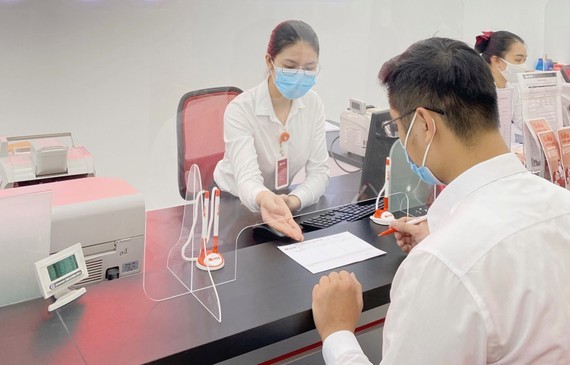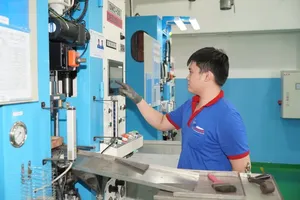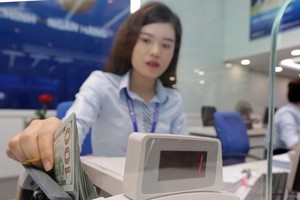 Illustrative image. (Photo: SGGP)
Illustrative image. (Photo: SGGP)
Many specific regulations
The State Bank has recently issued a document to remove obstacles so that commercial banks can have a basis to disburse the 2-percent interest rate support program from the State budget, according to Decree No.31/2022 of the Government and Circular No.03/2022 of the State Bank of Vietnam. It has met the borrowing demand of many enterprises in the context of increasing lending interest rates. Specifically, regarding the question of whether overdrafts are supported with interest rates, the SBV said that overdraft is one of the lending methods, so commercial banks are supported with interest rates as long as the borrowers qualify for this loan package.
The SBV also informed that customers receiving the 2-percent interest rate support must use their loans in sectors and fields specified in Decree No.31/2022. Therefore, loans to repay other loans are not supported with preferential interest rates. Similarly, offset loans or third-party loans to pay and cover expenses under business plans and projects are also not received interest rate support.
The SBV said that the interest rate support program only applies to interest payment obligations at interest payment terms that arise within the period from the effective date of Decree No.31/2022 (May 20, 2022) to December 31, 2023. Thus, customers are not entitled to interest rate support for interest payment terms that arise before the effective date of Decree No.31/2022.
For the term "not yet received interest rate support from the State budget according to other policies", the SBV explained that loans at any bank would be directly appraised and decided by that bank. Therefore, the bank is responsible for determining whether the loan has received interest rate support from the State budget according to other policies before giving a nod to the loan. The Ministry of Finance has also coordinated with the SBV to design regulations on the process of making estimates, payments, and settlements, limiting problems, and ensuring convenience for commercial banks to implement.
Credit room continues to get stuck
Although the SBV has issued a guiding document, many commercial banks are still wondering about the objects within the scope of the support program, so there is a potential risk of not being settled. According to TPBank's leader, the bank still has some interest-rate supported loans from 2010 and 2011 that cannot be settled and must be recorded in the bank's losses.
Similarly, a leader of a State-owned commercial bank said that in some cases, after applying preferential interest rates, when being audited, the enterprise could not prove its documents, so the bank had to withdraw the interest rate support, and the bank was sued by the enterprise. Agribank also said that there are still concerns about the finalization procedure with audited corporate reports and corporate tax reports, but in case these two reports do not match, commercial banks do not know how to handle this situation. Not to mention that, for customers in rural areas, input documents are not an easy matter, and these will be problems for banks when performing audits.
Besides, what most commercial banks are waiting for a response from the SBV is whether they can expand the credit room when they have already run out of credit room. According to a representative of a commercial bank, the bank's disbursement commitments have reached tens of trillion Vietnamese dong. However, it has to stop because its credit room has been exhausted from the second quarter of 2022. Many other commercial banks in HCMC also said that although they had completed the lending processes, they could not disburse the support package because there was no credit room. The leader of a commercial bank that has registered a loan balance of VND30 trillion for the 2-percent interest rate support package said that the bank was longing for the SBV to loosen the credit room to carry out this support package. It is also the reason why many businesses report that they have already finished loan procedures but have had to wait so far.
According to SBV Deputy Governor Dao Minh Tu, banks do not need to worry about credit room to implement interest rate support. Instead, what needs to be done right away is to perfect the lending mechanism. “The SBV will consider, calculate, and regulate the volume of credit provided to the economy so that credit growth must be consistent with the goal of controlling inflation, interest rate policy, and other macro relationships, at the same time, creating room to implement the 2-percent interest rate support policy," said Mr. Dao Minh Tu.
The State Bank has recently issued a document to remove obstacles so that commercial banks can have a basis to disburse the 2-percent interest rate support program from the State budget, according to Decree No.31/2022 of the Government and Circular No.03/2022 of the State Bank of Vietnam. It has met the borrowing demand of many enterprises in the context of increasing lending interest rates. Specifically, regarding the question of whether overdrafts are supported with interest rates, the SBV said that overdraft is one of the lending methods, so commercial banks are supported with interest rates as long as the borrowers qualify for this loan package.
The SBV also informed that customers receiving the 2-percent interest rate support must use their loans in sectors and fields specified in Decree No.31/2022. Therefore, loans to repay other loans are not supported with preferential interest rates. Similarly, offset loans or third-party loans to pay and cover expenses under business plans and projects are also not received interest rate support.
The SBV said that the interest rate support program only applies to interest payment obligations at interest payment terms that arise within the period from the effective date of Decree No.31/2022 (May 20, 2022) to December 31, 2023. Thus, customers are not entitled to interest rate support for interest payment terms that arise before the effective date of Decree No.31/2022.
For the term "not yet received interest rate support from the State budget according to other policies", the SBV explained that loans at any bank would be directly appraised and decided by that bank. Therefore, the bank is responsible for determining whether the loan has received interest rate support from the State budget according to other policies before giving a nod to the loan. The Ministry of Finance has also coordinated with the SBV to design regulations on the process of making estimates, payments, and settlements, limiting problems, and ensuring convenience for commercial banks to implement.
Credit room continues to get stuck
Although the SBV has issued a guiding document, many commercial banks are still wondering about the objects within the scope of the support program, so there is a potential risk of not being settled. According to TPBank's leader, the bank still has some interest-rate supported loans from 2010 and 2011 that cannot be settled and must be recorded in the bank's losses.
Similarly, a leader of a State-owned commercial bank said that in some cases, after applying preferential interest rates, when being audited, the enterprise could not prove its documents, so the bank had to withdraw the interest rate support, and the bank was sued by the enterprise. Agribank also said that there are still concerns about the finalization procedure with audited corporate reports and corporate tax reports, but in case these two reports do not match, commercial banks do not know how to handle this situation. Not to mention that, for customers in rural areas, input documents are not an easy matter, and these will be problems for banks when performing audits.
Besides, what most commercial banks are waiting for a response from the SBV is whether they can expand the credit room when they have already run out of credit room. According to a representative of a commercial bank, the bank's disbursement commitments have reached tens of trillion Vietnamese dong. However, it has to stop because its credit room has been exhausted from the second quarter of 2022. Many other commercial banks in HCMC also said that although they had completed the lending processes, they could not disburse the support package because there was no credit room. The leader of a commercial bank that has registered a loan balance of VND30 trillion for the 2-percent interest rate support package said that the bank was longing for the SBV to loosen the credit room to carry out this support package. It is also the reason why many businesses report that they have already finished loan procedures but have had to wait so far.
According to SBV Deputy Governor Dao Minh Tu, banks do not need to worry about credit room to implement interest rate support. Instead, what needs to be done right away is to perfect the lending mechanism. “The SBV will consider, calculate, and regulate the volume of credit provided to the economy so that credit growth must be consistent with the goal of controlling inflation, interest rate policy, and other macro relationships, at the same time, creating room to implement the 2-percent interest rate support policy," said Mr. Dao Minh Tu.
Regarding credit for real estate, the SBV assessed that the real estate market plays an important role and has a connection with many manufacturing industries. Over the years, the development of the real estate market has contributed to attracting resources and creating large fixed assets for the economy. However, credit is only one of many sources of capital in the real estate market. Besides credit capital, there is FDI capital, corporate bonds, stock market capital, and core capital of people and enterprises. These capital sources are also very large.
The bank's concern is capital loss risk, credit risk, and, more importantly, liquidity risk - due to the nature of real estate loans are long-term and large capital, while deposits are short-term. Therefore, as the Central bank and State management agency on banking activities, the SBV said it must regulate credit policies to ensure the safe operation of the banking system.
The bank's concern is capital loss risk, credit risk, and, more importantly, liquidity risk - due to the nature of real estate loans are long-term and large capital, while deposits are short-term. Therefore, as the Central bank and State management agency on banking activities, the SBV said it must regulate credit policies to ensure the safe operation of the banking system.
























